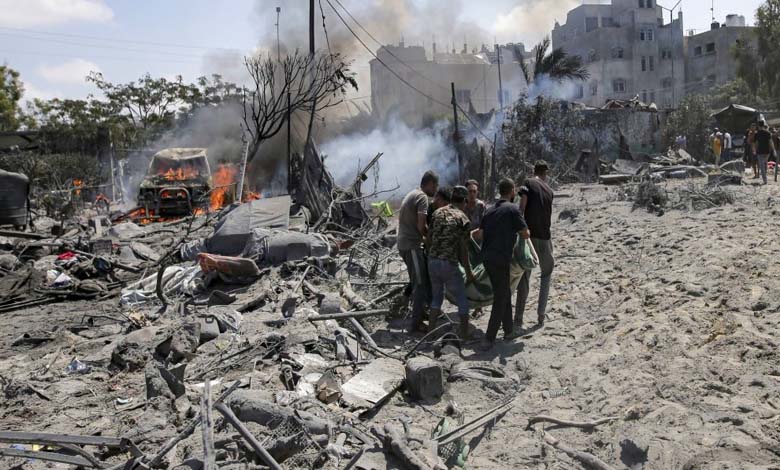Washington hopes to end the Gaza war following Sinwar’s death
Progress in negotiations for a ceasefire is contingent on the Israeli Prime Minister's stance and Hamas's willingness to release hostages.

The United States believes that with the death of Hamas leader Yahya Sinwar, there may be a real opportunity to reach an agreement that could end the ongoing war in the Gaza Strip, but this is linked to the position of Israeli Prime Minister Benjamin Netanyahu.
-
Number of Deaths in Gaza So Far: A Shocking Toll of the War
-
The “Buried” Nightmare in Gaza: A “Tip of the Iceberg” Awaiting the End of the War
As Washington continues its efforts to halt the war that has persisted for over a year in Gaza, three weeks before the U.S. presidential elections, President Joe Biden stated Thursday that “it is time to move forward” towards a ceasefire between Israel and Hamas, congratulating Netanyahu on the elimination of Sinwar.
He announced that he would send his Secretary of State, Antony Blinken, to Israel within “four or five days” to press the Israeli authorities on this issue.
-
Disengagement from Gaza: Did Hezbollah accept in private what it publicly rejected?
-
In Memory of the “Flood”: The War in Gaza Returns to Its Initial State
Biden and Netanyahu agreed during a phone call Thursday to “cooperate,” as tensions have loomed between them for months regarding Israel’s handling of the war that erupted after Hamas launched an unprecedented attack on southern Israel on October 7, 2024.
For her part, Democratic presidential candidate Vice President Kamala Harris noted that Sinwar‘s killing presents “an opportunity to finally end the war in Gaza.”
-
Rubble and Tombstones: “Unprecedented” Suffering in Gaza
-
One Year of War: Gaza, “The Largest Cemetery”
Harris is in a tight race with former Republican President Donald Trump for the upcoming presidential election on November 5, and she is aware that American support for Israel may cost her votes, especially in Michigan (North), a key state with a significant Arab-American population.
However, the war in Gaza is not over, as confirmed by Netanyahu, and there are no signs that Washington has the means to influence the Israeli Prime Minister.
Netanyahu has so far shown rigidity in his positions despite ongoing American pressures.
-
Gaza Setback and the Success of Israeli Spies: An Analysis of Hezbollah Infiltration
-
By the numbers… A year of destruction in Gaza
Sina Tusi from the Center for International Policy in Washington stated, “Theoretically, this should create an opportunity to end the war under the banner of ‘victory.'”
He added, “But the Israeli Prime Minister’s approach to the conflict over the past year suggests otherwise.”
He particularly noted that he supported the “continuation” of the conflict in Gaza, “apparently betting on Donald Trump‘s victory in the U.S. elections to redraw the region with increased American support.”
-
“The Island”… What do we know about Israel’s latest plans for northern Gaza?
-
Continuous Humanitarian Initiatives: The UAE Strengthens International Cooperation to Support Gaza
Andrew Miller from the Center for American Progress clarified that “if the Israeli government wanted, it could use this as an excuse to assert that it achieved its goals.”
However, he continued, “I am not very optimistic about the ability of Prime Minister Netanyahu and his coalition to do that.”
The United States is Israel’s primary military and political partner, providing it with steady support, despite expressing concern about Netanyahu‘s management of the war and condemning the toll on civilian casualties.
-
After new demands from Hamas and Israel’s intransigence… have the Gaza truce negotiations stalled?
-
Why Can’t the United States Withdraw from Gaza Negotiations?
This week, Washington threatened to suspend part of its military aid if no improvement is seen in the entry of humanitarian assistance into the devastated and besieged Gaza Strip.
But aside from suspending a shipment of bombs in May, Washington has not used military supplies as a means of pressure on Israel, while declaring its support for the Jewish state in its war against Hamas and, more recently, against the Lebanese Hezbollah, which the U.S. designates as “terrorist organizations.”
However, some American officials acknowledge that it is still “too early” to know how Netanyahu will react after Sinwar‘s elimination, noting that he may decide to “complete the mission.”
-
Washington Pushes for the Deployment of Peacekeeping Forces in Gaza Ceasefire Arrangements
-
In Gaza… medicine is a rare commodity… and polio is a looming threat
The attention of the international community is also focused on Israel’s response to the recent Iranian missile strike.
Washington views Sinwar‘s death as removing a major obstacle to achieving a ceasefire in Gaza and releasing hostages held in the region.
However, on the other hand, Netanyahu, who heads a coalition government with far-right ministers, has not responded to Washington’s repeated calls or warnings about expanding the conflict into Lebanon, where Israel has been conducting intensive air strikes and limited ground operations against Hezbollah since September 23, escalating the exchanges of fire at the border that have been occurring since the party supported by Iran announced an opening of a “support” front for Gaza following Hamas’s attack.
-
Gaza Negotiations: 7 Arduous Hours
-
Gaza War: How Did “Amazon” Contribute to the Precision of Israeli Airstrikes?
A ceasefire in Gaza would be favorable for Kamala Harris, who, like Biden, asserts her “strong” support for Israel, but she faces criticism from the left of the Democratic Party.
Tusi emphasized that the fate of the 101 hostages still held in Gaza, including Americans, will be a crucial point, a question that has sparked massive protests in Israel.
If Netanyahu succeeds in securing their release, it will bolster his position, according to Tusi. Conversely, if he fails, it could severely damage his standing.












